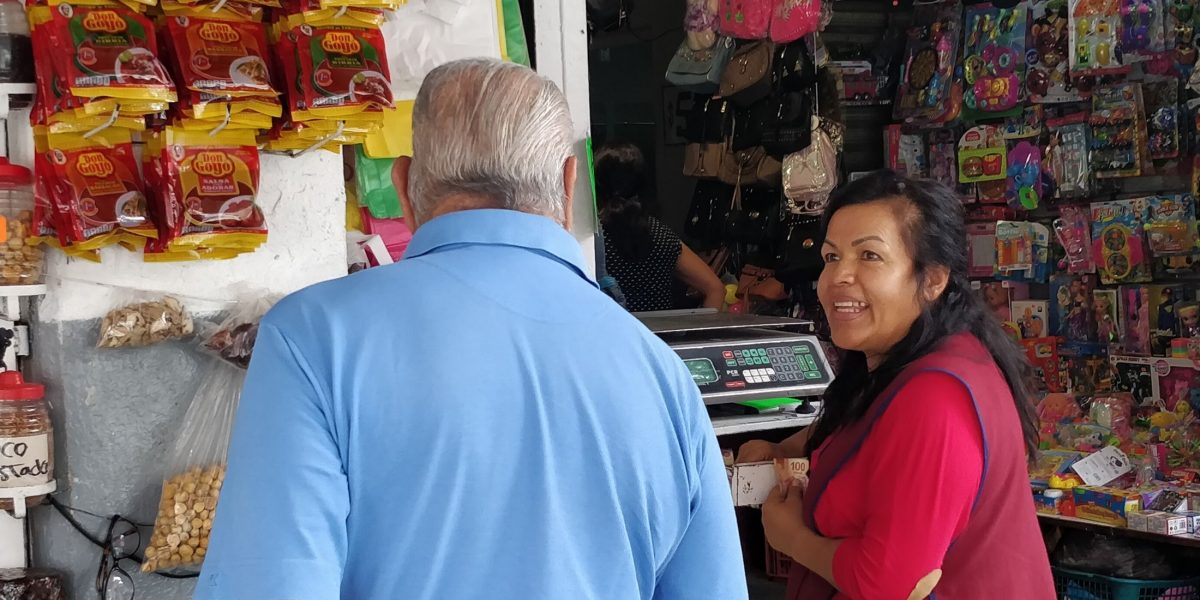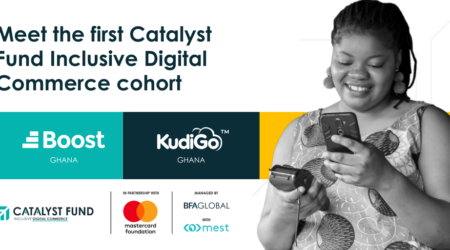Catalyst Fund launches in Mexico in the middle of a “kodak moment”

A “Kodak moment” once signified an instant worth enjoying and immortalizing. But today, the term is increasingly used to warn incumbents of the need to react and respond to market disruptions to avoid obsolescence. Considering the COVID-19 pandemic, participants in a recent Catalyst Fund webinar concluded that inclusive fintech startups are indeed in the midst of a “kodak moment”. The Catalyst Fund startup accelerator recently launched in Mexico with a virtual session featuring more than 25 leading organizations in the Mexican fintech ecosystem.
In addition to celebrating the launch of Catalyst Fund in Mexico, participants joined a conversation about the challenges and opportunities that this global pandemic presents and how we might continue to improve the financial health of Mexicans through fintech innovations. The session featured the perspectives of startups, investors, banks, accelerators, the Fintech Mexico association, the National Banking and Securities Commission (CNBV) and other experts in inclusive fintech, through a guided talk by Gabriela Zapata.
Together, they concluded that the pandemic is indeed a “Kodak moment” for the financial sector for two different reasons. On the one hand, the crisis warns incumbents and startups alike that to avoid the same fate as Kodak, it is essential to redesign products and services that respond to the new, urgent needs and preferences of users. On the other hand, it also offers us an unprecedented opportunity to positively transform the industry through innovations for financial inclusion, which would undoubtedly be a time to remember.
The general perception of startups is that, even with all the challenges of operating in this new context, the pandemic has proved to be an opportunity to remember the why of our work. If this pandemic has made one thing clear, it is that, as the findings of our rapid survey in emerging markets show, the underserved are disproportionately affected. As Leticia Robles from Konfío commented, “we see this crisis not only as a challenge, but also as an opportunity to live our mission and continue to find ways to support our clients.”
As such, startups with an inclusive approach are rethinking the tools and elements of their business models to center their original missions. Such is the case of Miguel Duhalt from Comunidad 4Uno, “For an agnostic platform in terms of tools such as 4Uno where we offer insurance, savings, and credit, this pandemic is an opportunity to continue increasing the resilience of workers in a state of economic vulnerability through even further personalized products. For example, at the moment we are developing a resilience score, which will allow us to provide customized products that protect our users in this crisis and in those that come.”
Another obvious consequence of the pandemic is that consumer attitudes and habits have changed. Francisco Meré of Fintech Mexico indicated that “many of the conceptual barriers to digitization are breaking down.” For example, it is clear that fewer and fewer people will want to go to a branch or use cash, and that many others will begin to transact online.
This new normal suggests that there is a growing willingness among customers to test new products, particularly digital solutions that allow them to do things remotely. Therefore, those companies that can understand their needs, habits and preferred experiences when designing products and services, will have a greater chance of prospering.
Consequently, the most agile and user-focused startups will be best positioned to respond to the needs of this new context. Faced with the difficulty of trying to predict when things will return to normal, or if they ever will, startups with speed to develop products that meet the immediate needs of users, as well as the technical powers to develop reliable solutions, will become indispensable.
However, there are four factors that will shape the future of the sector.
Even though startups are in a relatively good position to respond to this crisis in terms of attitude and culture, it is unclear whether the conditions of the ecosystem are entirely favorable. We identified two important barriers, as well as two uncertainties that could increase or decrease the chances of success for inclusive fintech companies.
Access to capital
First, innovation is neither easy nor inexpensive, and there will be few funds available to finance startups looking to reinvent themselves or test new products or services. The group of investors that attended the launch event agreed that the deployment of new capital will be highly conservative for most funds, and that access to capital markets is virtually closed for the moment.
Given the current context, raising capital for those companies that are looking to do it for the first time will be extremely difficult. This argument was shared by investors such as ALLVP and Fondo de Fondos, who confessed that the focus of their funds in the following months, like that of many others, will be in supporting their existing portfolio.
In terms of recommendations for companies, Maria Tellez, Principal of Mountain Nazca, suggests: “If you have already raised, turn to your cap table to receive support from your current investors, be very cautious in preserving your runway and focus on lowering your burn rate as much as possible.” In turn, Hernán Fernández from Angel Ventures warned that, “This is a matter of fat, muscle and bone. It is very likely that many companies have already seen the need to cut fat and are operating on muscle. However, you have to be ready to operate in skeleton mode for the next few months.”
For their part, investors such as Matías Lanús of Elevar Equity, recognized that this may be a good time for funds to find and invest bridge capital in startups that are in a good position to capture market opportunities. Francisco Meré, who is also an LP in various investment funds, added that, “indeed, there will be many opportunities for investors to buy distressed assets. These times force us to ask ourselves if there are opportunities for mergers or acquisitions that would allow us to keep our businesses alive.”
Demand for credit and default rates
The second challenge that attendees identified is trying to break the vicious circle generated by the growing demand for credit sources to cope with the crisis on the one hand, and credit default and the reluctance on the investors’ side to finance due to the poor performance of their portfolios on the other.
Although many innovative startups have focused on offering financial services that go beyond credit, initial evidence suggests that underserved clients are highly focused on securing funding sources at this moment. Companies such as Destácame and Konfío shared that the demand for loans, both from individuals and companies, has increased and, along with it, default rates.
Jorge Camus from Destácame commented that, “we have seen a stronger impact on the delivery of loans; what we are observing is that, given the crisis, default rates have increased, and what this has caused is that funders are cutting credit.” Faced with this situation, investors such as the BID Lab, who have seen the same need in their portfolios, have made credit lines available to their companies to support them at this difficult time.
In general, few have cash to lend, and those who do will have to be careful about managing risk. However, there may be an upside. For example, SMEs tend to demonstrate resilience in the face of crises, and it is likely that those that show daring and dynamism may be in a better position to recover from the crisis.
Startups’ competitive advantage
The first uncertainty regarding the future of fintechs is how durable their competitive advantage in innovation and user experience will be. The current situation has pushed banks to invest more in their customers’ digital experience and product innovation. In this sense, Francisco Junco shared from the perspective of Gentera that “many of the corporate innovation projects have seen a considerable boost; particularly those related to the adoption of certain technologies that previously had integration challenges to the corporate’s core.” Francisco Perales of Accendo mentioned that, “for fintech startups and banks that are betting more on digital innovation, this is a key moment of differentiation, and the main strategy to prosper in this context will be partnerships between banks and fintech startups.”
Authorities and regulation
The second uncertainty arises from the role that regulation will play in this context. Some participants expressed concern about rules that could make fintech operations more expensive. Rocío Robles, ex-Director General of Supervision of Financial Technology Institutions at the CNBV, said that, “In this context where we are approaching a major economic crisis, the authority must show sensitivity in the implementation of some fintech operation rules and either adapt their timeline or make the rules of operation less expensive for startups.” The regulatory expert has no doubt that, with the talent and chameleon-like capacity of startups, they will emerge from this crisis with even more innovative proposals. However, she stressed the fact that it will be important for companies to maintain an open dialogue with the regulator.
For his part, Ernesto Calero, General Director of Fintech Supervision at the CNBV, reiterated the commitment that the commission has to be an ally for startups and maintain the principles of inclusion and innovation as the north. To this end, the CNBV, in alliance with UKAID through the Prosperity Fund (DAI), made the Sandbox Challenge available to the ecosystem. This is an initiative that allows entrepreneurs to test their business models in the Mexican financial system through the Fintech Law Novel Models scheme and under a regulatory sandbox.
Finally, the accelerators at the event assured that, through programs such as Finance Forward and SAFINN Irrazonable, the effort on their behalf to support startups will continue; even going so far as to adapt their programs to offer support on relevant issues such as resilience of business models.
A “Kodak moment”
If financial sector players want to avoid the same fate as Kodak in 2012, these unprecedented times present a great opportunity for them to reinvent themselves and design innovative solutions that address the specific needs of underserved populations. The way in which we react to this opportunity could make the fintech industry more sensitive, supportive, inclusive, and with a greater capacity to respond to crises. Such a future will give us another kind of “Kodak moment” – one that we can remember proudly.

Over the next three years, Catalyst Fund will support 30 early-stage inclusive fintech startups in Kenya, South Africa, Nigeria, India and Mexico. In each country we will become deeply ingrained in the innovation ecosystems in order to build the support networks that these inclusive fintech startups will need to scale their impact. As we begin our work in Mexico, we are excited to see a united community with so much interest in developing technological solutions that improve the financial health of those who, until now, have been invisible to the financial system.


